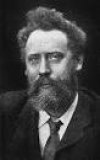Analysis of The Surges Gushed And Sounded
William Ernest Henley 1849 (Gloucester) – 1903 (Woking)
The surges gushed and sounded,
The blue was the blue of June,
And low above the brightening east
Floated a shred of moon.
The woods were black and solemn,
The night winds large and free,
And in your thought a blessing seemed
To fall on land and sea.
| Scheme | XAXA XBXB |
|---|---|
| Poetic Form | Quatrain |
| Metre | 0101010 0110111 010101001 100111 0101010 011101 00110101 111101 |
| Closest metre | Iambic tetrameter |
| Characters | 250 |
| Words | 50 |
| Sentences | 3 |
| Stanzas | 2 |
| Stanza Lengths | 4, 4 |
| Lines Amount | 8 |
| Letters per line (avg) | 25 |
| Words per line (avg) | 6 |
| Letters per stanza (avg) | 98 |
| Words per stanza (avg) | 24 |
Font size:
Submitted on May 13, 2011
Modified on March 05, 2023
- 15 sec read
- 76 Views
Citation
Use the citation below to add this poem analysis to your bibliography:
Style:MLAChicagoAPA
"The Surges Gushed And Sounded" Poetry.com. STANDS4 LLC, 2024. Web. 27 Apr. 2024. <https://www.poetry.com/poem-analysis/40559/the-surges-gushed-and-sounded>.


Discuss this William Ernest Henley poem analysis with the community:
Report Comment
We're doing our best to make sure our content is useful, accurate and safe.
If by any chance you spot an inappropriate comment while navigating through our website please use this form to let us know, and we'll take care of it shortly.
Attachment
You need to be logged in to favorite.
Log In